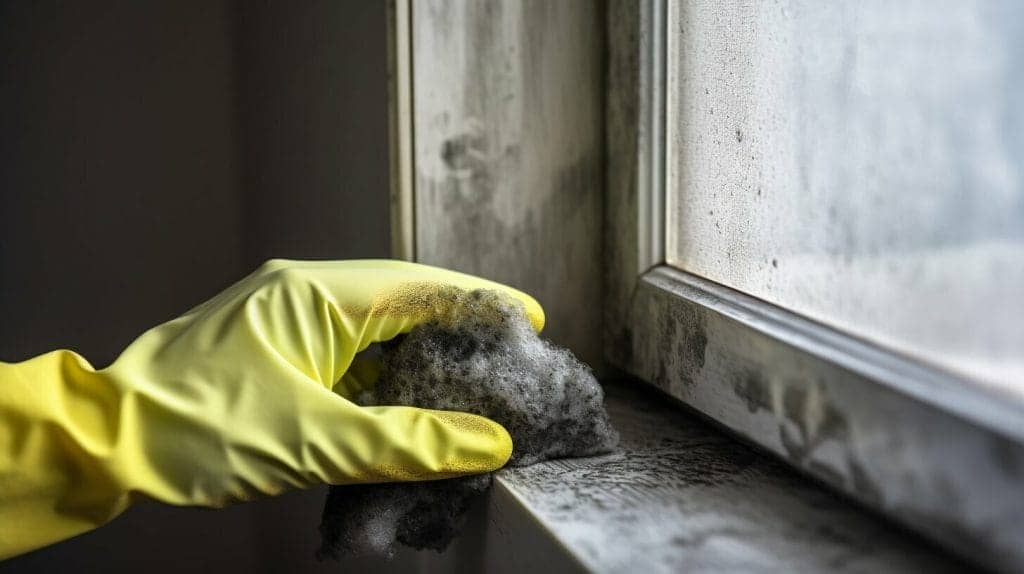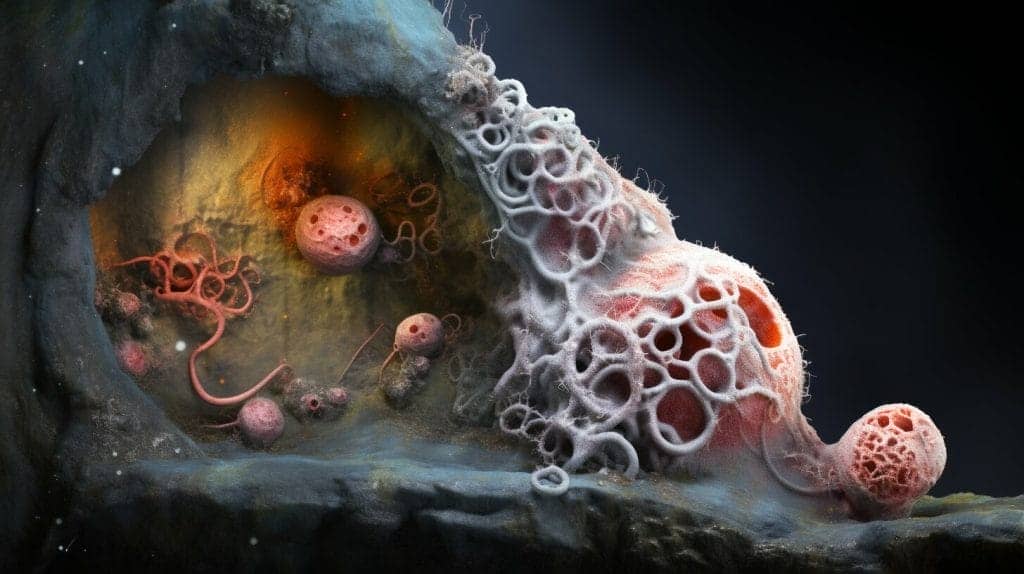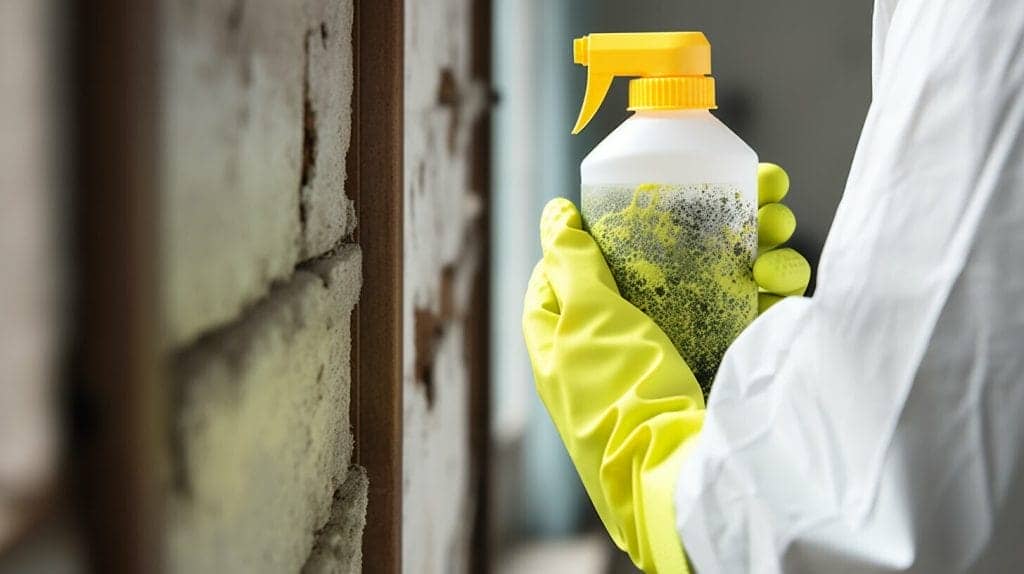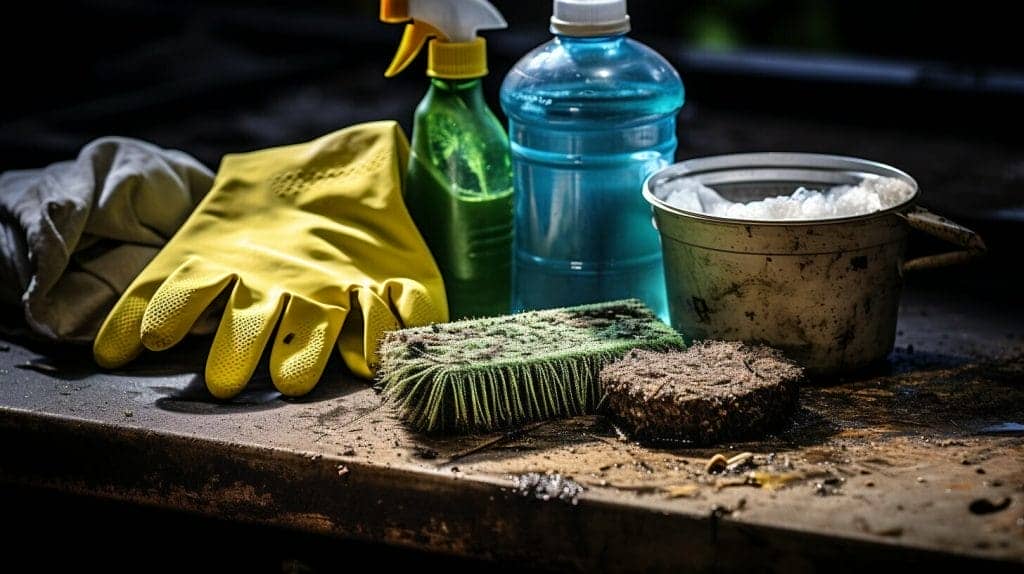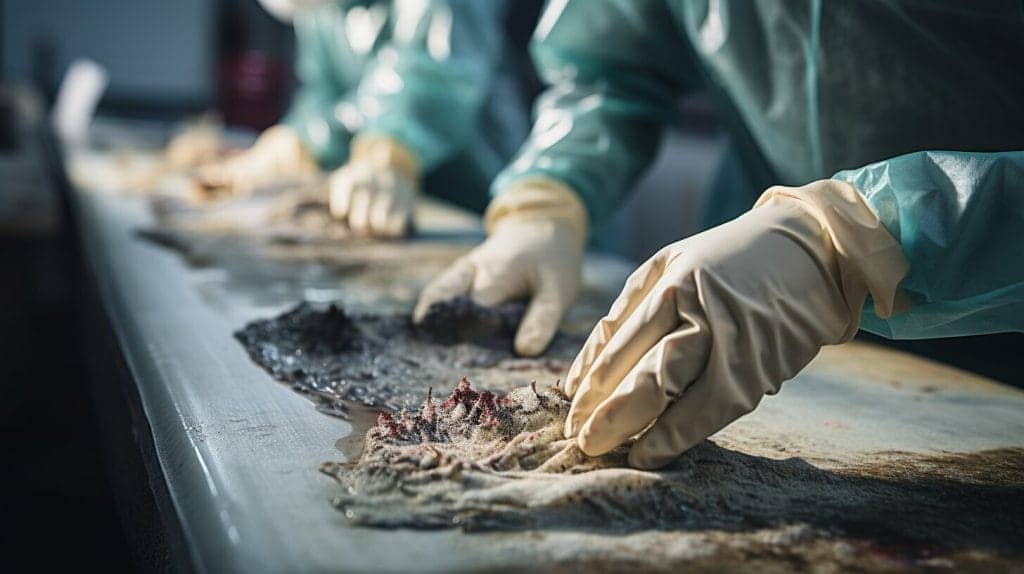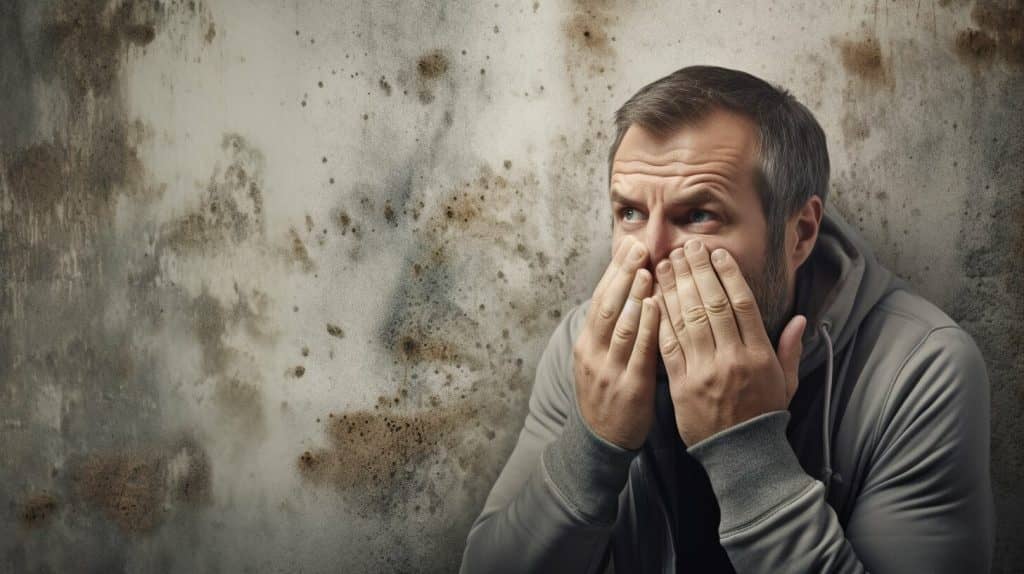If you suspect that you or a loved one has been exposed to mold and are experiencing symptoms such as respiratory issues, headaches, or fatigue, it’s imperative to seek professional medical attention. Mold poisoning can be a serious condition that requires specialized expertise to ensure effective diagnosis and treatment.
In this article, we will provide an overview of medical centers specializing in mold poisoning treatment. We will discuss the dangers of mold toxicity, treatment options, and the importance of seeking expert care for mold-related illnesses.
Key Takeaways:
- Mold poisoning can have serious health consequences and requires specialized medical care.
- Medical centers specializing in mold poisoning treatment offer comprehensive options for diagnosis and treatment.
- Patient success stories and testimonials highlight the importance of seeking expert care for mold-related illnesses.
Understanding Mold Poisoning and its Symptoms
Mold poisoning, also known as toxic mold syndrome, refers to the adverse health effects caused by exposure to toxic mold. Mold is a type of fungus that can grow in moist and warm conditions. Exposure to mold can occur through ingestion, inhalation, or skin contact. Mold poisoning can affect anyone, but certain individuals may be at a higher risk, including those with weakened immune systems or pre-existing respiratory conditions.
The symptoms of mold exposure can vary, but they commonly include respiratory issues, such as coughing, wheezing, and difficulty breathing. Other symptoms may include headache, fatigue, joint pain, and skin irritation. It is essential to seek proper diagnosis for mold sickness, as many of the symptoms can be similar to those of other illnesses.
Diagnosis of Mold Sickness
Diagnosis of mold sickness typically involves a thorough medical history and physical examination. The doctor may also order blood tests, imaging studies, or pulmonary function tests to assess the extent of the damage caused by mold exposure. In some cases, a skin prick test or a patch test may be necessary to identify the specific type of mold causing the symptoms.
A proper diagnosis is crucial for effective treatment of mold poisoning. Without appropriate care, mold exposure can lead to chronic health problems and a reduced quality of life. However, with the right medical attention and treatment, patients can experience significant improvements in their symptoms and overall health.
The Dangers of Mold Toxicity
Mold toxicity, also known as toxic mold syndrome, refers to the harmful effects of exposure to certain types of mold. While mold is a common household problem, certain species of mold can produce toxins that can have severe health implications.
Exposure to toxic mold can lead to a range of symptoms, including respiratory problems, skin irritation, headaches, and fatigue. In severe cases, exposure to toxic mold can result in neurological damage and immune system suppression.
Long-term exposure to toxic mold can lead to chronic health issues and may increase the risk of certain diseases. Individuals with compromised immune systems, such as the elderly and young children, are particularly vulnerable to the harmful effects of toxic mold.
It is important to seek specialized treatment for mold toxicity to address the underlying health concerns and prevent further exposure. Dedicated medical centers, such as mold toxicity clinics, can provide comprehensive care and expertise in managing mold exposure and offering appropriate treatment options.
Mold Poisoning Treatment Options
There are several treatment options available for individuals suffering from mold poisoning. The best course of treatment will depend on the severity of the mold illness and the patient’s individual needs.
Medications: Antifungal medications may be prescribed to help eliminate mold from the body. Other medications may be prescribed to alleviate symptoms such as allergies or asthma.
Lifestyle Changes: Making certain lifestyle changes such as improving indoor air quality, reducing exposure to mold, and adopting a nutritious diet can help improve overall health and aid in recovery.
Environmental Remediation: Removing mold from the patient’s living environment is critical to long-term recovery. This may involve repairing water damage, fixing leaks, and removing affected materials.
A comprehensive approach to mold poisoning treatment often involves a combination of these options. It is important to work with an experienced healthcare provider who can help design an individualized treatment plan tailored to your specific needs.
Holistic Treatment at Oasis Medical Institute
Oasis Medical Institute in Tijuana, MX is a leader in holistic mold toxicity treatment programs. With over 40 years of experience in integrative medicine, Dr. Francisco Contreras MD has developed a comprehensive approach to treating mold-related illnesses.
The holistic mold toxicity treatment program at Oasis Medical Institute focuses on addressing the root causes of mold exposure and improving overall health and wellness. Treatment options include dietary changes, nutritional supplements, detoxification, emotional support, and natural therapies.
Dr. Contreras and his team believe in an individualized approach to treatment, tailoring each plan to the patient’s unique needs and circumstances. The program includes regular follow-up appointments, ongoing monitoring, and support from a team of dedicated professionals.
Patients at Oasis Medical Institute also have access to state-of-the-art facilities and innovative therapies, including hyperbaric oxygen therapy, ozone therapy, and stem cell therapy. These cutting-edge treatments can help boost the immune system and accelerate healing, improving outcomes for patients.
If you’re looking for a holistic mold detoxification center, Oasis Medical Institute may be the right choice for you. Contact them today to learn more about their comprehensive approach to treating mold-related illnesses.
Finding a Medical Center Near You
When it comes to finding medical care for mold poisoning, it’s essential to seek out professionals with the expertise to properly identify and treat the condition.
Start by researching healthcare centers that specialize in mold-related illnesses. You can find a list of such medical centers by searching online or asking for recommendations from your physician.
Consider the location of the medical center and whether it’s easily accessible to you. You may also want to evaluate its reputation and patient reviews to get a sense of the quality of care provided.
When reaching out to a medical center, be sure to inquire about the services they offer and the experience of the staff. It’s important to find a center that can provide comprehensive care, including mold remediation guidance, if necessary.
Don’t hesitate to ask questions and seek out the best possible care. Your health and well-being are of the utmost importance, and finding the right medical center can make all the difference in your recovery.
Importance of Expert Care and Specialized Expertise
When seeking treatment for mold poisoning, it is crucial to find a medical center with expertise in this area. Mold toxicity can be complex and difficult to diagnose, which is why specialized knowledge and resources are essential for effective treatment.
Medical centers for mold poisoning have the necessary tools and resources to properly diagnose and treat patients with mold-related illnesses. These centers employ physicians and healthcare professionals who are trained in mold toxicity and are equipped to identify the signs and symptoms of mold exposure.
Additionally, medical centers specializing in mold poisoning may offer unique treatment approaches that are not available at other healthcare facilities. This may include specialized medications, detoxification programs, and integrative therapies.
Innovative medical centers like Oasis Medical Institute in Tijuana, MX, for example, offer a holistic approach to mold toxicity treatment that includes a combination of conventional and alternative therapies. This comprehensive approach may include detoxification programs, immune system support, and dietary changes.
Overall, seeking care from a medical center with expertise in mold poisoning is crucial for achieving a successful recovery. These centers have the specialized knowledge and resources necessary to properly diagnose and treat mold-related illnesses, leading to better outcomes for patients.
Choosing the Right Medical Center for Mold Poisoning Treatment
When it comes to choosing a medical center for mold poisoning treatment, there are several factors to consider. Patients should prioritize centers with specialized expertise in mold-related illnesses, as well as those located near their home or workplace for ease of access.
It is also important to research the reputation of the medical center, including their success rates and patient reviews. When evaluating potential centers, patients should inquire about the treatment options offered, such as medications, lifestyle changes, and environmental remediation.
Factors to Consider
Specialized expertise in mold poisoning treatment should be a top priority when selecting a medical center. This includes knowledge of mold exposure symptoms and effective treatment options, as well as experience with patient care for mold-related illnesses.
Location is also a crucial factor, as patients will need to visit the center regularly for appointments and treatments. A center located near the patient’s home or workplace can reduce travel time and make treatment more manageable.
Reputation is another important consideration, as it can be a good indicator of the quality of care provided by the center. Patients should research the center’s success rates, patient reviews, and any awards or recognitions they have received.
Personalized Care
Patients should prioritize medical centers that offer personalized care, tailored to their unique needs and circumstances. This may include a comprehensive evaluation of their living environment to identify potential sources of mold exposure, as well as guidance on lifestyle changes to support their recovery.
Additionally, medical centers with a multidisciplinary team of healthcare professionals, including physicians, nurses, and environmental specialists, can provide a more comprehensive approach to treatment.
Overall, patients should take the time to carefully evaluate potential medical centers for mold poisoning treatment. By prioritizing specialized expertise, location, reputation, and personalized care, patients can make an informed decision and receive the best possible care for their mold-related illness.
The Role of Mold Remediation in Recovery
Mold remediation is a crucial step in recovering from mold poisoning. Medical centers specializing in mold poisoning treatment can provide guidance and resources for addressing mold exposure in the patient’s living environment. These centers can connect patients with reputable mold remediation experts who can assess the extent of mold growth in their homes and develop a plan for removing it.
Mold remediation may involve several steps, such as identifying sources of moisture, containing the affected area, and using specialized equipment to contain and remove mold spores. Depending on the extent of the mold growth, it may be necessary to replace damaged materials, such as drywall or carpeting. Effective mold remediation not only helps to prevent further exposure to mold but can also promote healing and recovery by improving the patient’s overall living environment.
Patient Success Stories and Testimonials
Patients seeking treatment for mold poisoning may find it reassuring to read about the experiences of others who have gone through the same process. Many medical centers for mold poisoning share success stories and testimonials on their websites to offer hope and inspiration to new patients.
For example, one patient at a mold toxicity clinic reported experiencing chronic fatigue and respiratory issues – symptoms that disappeared after treatment. Another individual spoke of suffering from brain fog and severe headaches, which subsided after undergoing a personalized treatment plan.
These success stories demonstrate the positive impact that expert care can have on individuals struggling with mold poisoning. By sharing their experiences, patients can offer hope and encouragement to others who may be feeling overwhelmed or uncertain about seeking treatment.
“I was hesitant to seek treatment for my mold illness, but after reading about the positive experiences of others, I felt more confident in my decision. Now, I’m feeling better than ever thanks to the care and expertise of my medical center.” – Sarah L.
Insurance Coverage and Financial Considerations
When considering treatment for mold poisoning, it’s important to understand your insurance coverage and any potential financial considerations. Many medical centers specializing in mold poisoning treatment accept insurance, but it’s important to verify coverage with your provider before booking a consultation.
If you have a high deductible or limited insurance coverage, you may be concerned about the cost of treatment. However, many centers offer financial assistance programs or payment plans to help patients manage their expenses. It’s important to discuss your options with the center’s financial coordinator to determine what assistance may be available to you.
Additionally, some insurance providers may require pre-authorization before covering mold poisoning treatment. Make sure to check with your provider to see if this is required and what steps are necessary to obtain authorization.
Overall, while the cost of mold poisoning treatment can be a concern, it’s important to prioritize your health and seek expert care at a medical center specializing in mold poisoning. Don’t let financial considerations prevent you from receiving the treatment you need and deserve.
Booking a Consultation for Mold Poisoning Treatment
If you think that you may be suffering from mold poisoning, it is important to seek expert care from a medical center specializing in mold-related illnesses. Booking a consultation is the first step towards receiving a proper diagnosis and effective treatment.
There are several ways to book a consultation with a mold poisoning treatment center, including:
| Method | Description |
|---|---|
| Phone | Many medical centers have dedicated phone lines for scheduling appointments. Look up the contact information for the center of your choice and call to book a consultation. |
| Some centers may offer the option to email for a consultation. Check their website or contact them directly to inquire about this option. | |
| Online Form | Many centers have online forms that you can fill out to request a consultation. These can often be found on their website. |
Regardless of the method you choose, be prepared to provide your personal information and a brief description of your symptoms or concerns. Some centers may also require a referral from your primary care physician.
It is important to book a consultation with a reputable medical center that specializes in mold poisoning treatment, to ensure that you receive the best possible care. Take the time to research and compare centers in your area before making a decision.
Additional Tip:
Remember to bring any relevant medical records or test results to your consultation, to help the medical team better understand your condition.
Exploring Additional Resources on Mold Poisoning
For those seeking more information on mold poisoning and its treatment options, there are a variety of resources available. These resources can provide further education, support, and guidance for individuals impacted by mold exposure.
Books
There are several books available that provide in-depth information on mold illness and its treatment. Some recommended titles include:
| Title | Author |
|---|---|
| The Mold Survival Guide: For Your Home and Health | Jeff Bookout |
| Mold: The War Within | Kurt and Lee Ann Billings |
| The Fungal Pharmacy: The Complete Guide to Medicinal Mushrooms and Lichens of North America | Robert Rogers |
Websites
There are several websites that provide helpful information on mold illness, treatment options, and the latest research. Some recommended websites include:
- The Mold Help Organization
- National Organization of Remediators and Mold Inspectors
- Surviving Mold
- Environmental Health Center-Dallas
Support Groups
Support groups can be an excellent resource for individuals impacted by mold illness. These groups can provide emotional support, advice, and encouragement throughout the recovery process. Some recommended support groups include:
- Mold Support Group
- Mold Avoiders
- Mold Warriors
By utilizing these additional resources, individuals impacted by mold exposure can gain a deeper understanding of their condition and find support throughout their recovery journey.
Conclusion
In conclusion, mold poisoning is a serious health concern that requires specialized expertise and care. Medical centers dedicated to mold poisoning treatment can offer patients access to a range of treatment options, including medications, lifestyle changes, and environmental remediation. It is crucial to seek care from experienced professionals who can properly diagnose and treat mold-related illnesses.
Oasis Medical Institute in Tijuana, MX, offers a holistic approach to mold toxicity treatment, emphasizing the importance of a comprehensive program for recovery. Patients have seen positive outcomes and improved health and well-being after receiving care at these specialized clinics.
When selecting a medical center for mold poisoning treatment, patients should consider factors such as location, reputation, patient reviews, and specialized expertise. It is also important to address mold exposure in the patient’s living environment through mold remediation.
Insurance coverage and financial considerations may also be a concern for those seeking mold poisoning treatment, and patients should explore available resources for financial assistance.
Ultimately, the key takeaway is to prioritize your health and seek expert care for mold-related illnesses. By educating yourself, seeking out specialized medical centers, and taking action towards proper treatment, you can improve your overall health and well-being.
FAQ
Q: What is mold poisoning?
A: Mold poisoning refers to the adverse health effects that can occur when a person is exposed to high levels of mold spores. It can cause a range of symptoms and health issues.
Q: What are the symptoms of mold exposure?
A: Symptoms of mold exposure can vary but commonly include coughing, wheezing, sneezing, allergic reactions, headaches, fatigue, and respiratory problems.
Q: Are there specialized medical centers for mold poisoning?
A: Yes, there are medical centers that specialize in the diagnosis and treatment of mold poisoning. These centers have expertise in managing mold-related illnesses.
Q: What are the dangers of mold toxicity?
A: Mold toxicity can have serious health implications, including respiratory problems, weakened immune system, neurological issues, and chronic illnesses.
Q: What treatment options are available for mold poisoning?
A: Treatment options for mold poisoning may include medications, lifestyle changes, environmental remediation, and holistic approaches to address both the symptoms and underlying causes.
Q: What is the holistic treatment program at Oasis Medical Institute?
A: Oasis Medical Institute offers a holistic approach to mold toxicity treatment, incorporating integrative therapies and personalized care for comprehensive healing.
Q: How can I find a medical center near me for mold poisoning treatment?
A: To find a medical center specializing in mold poisoning treatment, you can research online directories, seek recommendations from healthcare professionals, or contact local healthcare organizations.
Q: Why is it important to seek expert care for mold poisoning?
A: Seeking expert care is crucial because medical centers specializing in mold poisoning have the knowledge and resources to provide targeted treatments for improved outcomes.
Q: What should I consider when choosing a medical center for mold poisoning treatment?
A: Factors to consider include the center’s expertise in mold-related illnesses, location, reputation, patient reviews, and the availability of specialized treatments.
Q: What role does mold remediation play in recovery?
A: Mold remediation is an essential part of the recovery process. Medical centers specializing in mold poisoning treatment can guide patients on identifying and addressing mold exposure in their environment.
Q: Are there any patient success stories and testimonials from medical centers treating mold poisoning?
A: Yes, many patients have shared success stories and testimonials about their experiences at medical centers for mold poisoning treatment, highlighting improvements in their health and well-being.
Q: Does insurance cover mold poisoning treatment?
A: Insurance coverage for mold poisoning treatment can vary. It’s advisable to consult with your insurance provider to determine coverage and potential financial considerations.
Q: How can I book a consultation for mold poisoning treatment?
A: To book a consultation, you can reach out to a medical center specializing in mold poisoning treatment through their contact information provided on their website or by calling their office directly.
Q: Where can I find additional resources on mold poisoning?
A: Additional resources on mold poisoning, including books, websites, and support groups, can provide valuable information and support. Make use of these resources to educate yourself further.
Dr. Francisco Contreras, MD is a renowned integrative medical physician with over 20 years of dedicated experience in the field of integrative medicine. As the Medical Director of the Oasis of Hope Hospital in Tijuana, Mexico, he has pioneered innovative treatments and integrative approaches that have been recognized globally for the treatment of cancer, Lyme Disease, Mold Toxicity, and chronic disease using alternative treatment modalities. Dr. Contreras holds a medical degree from the Autonomous University of Mexico in Toluca, and speciality in surgical oncology from the University of Vienna in Austria.
Under his visionary leadership, the Oasis of Hope Hospital has emerged as a leading institution, renowned for its innovative treatments and patient-centric approach for treating cancer, Lyme Disease, Mold Toxicity, Long-Haul COVID, and chronic disease. The hospital, under Dr. Contreras's guidance, has successfully treated thousands of patients, many of whom traveled from different parts of the world, seeking the unique and compassionate care the institution offers.
Dr. Contreras has contributed to numerous research papers, articles, and medical journals, solidifying his expertise in the realm of integrative medicine. His commitment to patient care and evidence-based treatments has earned him a reputation for trustworthiness and excellence. Dr. Contreras is frequently invited to speak at international conferences and has been featured on CNN, WMAR2 News, KGUN9 News, Tyent USA, and various others for his groundbreaking work. His dedication to the medical community and his patients is unwavering, making him a leading authority in the field.
Contreras has authored and co-authored several books concerning integrative therapy, cancer, Lyme Disease and heart disease prevention and chronic illness, including "The Art Science of Undermining Cancer", "The Art & Science of Undermining Cancer: Strategies to Slow, Control, Reverse", "Look Younger, Live Longer: 10 Steps to Reverse Aging and Live a Vibrant Life", "The Coming Cancer Cure Your Guide to effective alternative, conventional and integrative therapies", "Hope Medicine & Healing", "Health in the 21st Century: Will Doctors Survive?", "Healthy Heart: An alternative guide to a healthy heart", “The Hope of Living Cancer Free”, “Hope Of Living Long And Well: 10 Steps to look younger, feel better, live longer” “Fighting Cancer 20 Different Ways”, "50 Critical Cancer Answers: Your Personal Battle Plan for Beating Cancer", "To Beat . . . Or Not to Beat?", and “Dismantling Cancer.”



